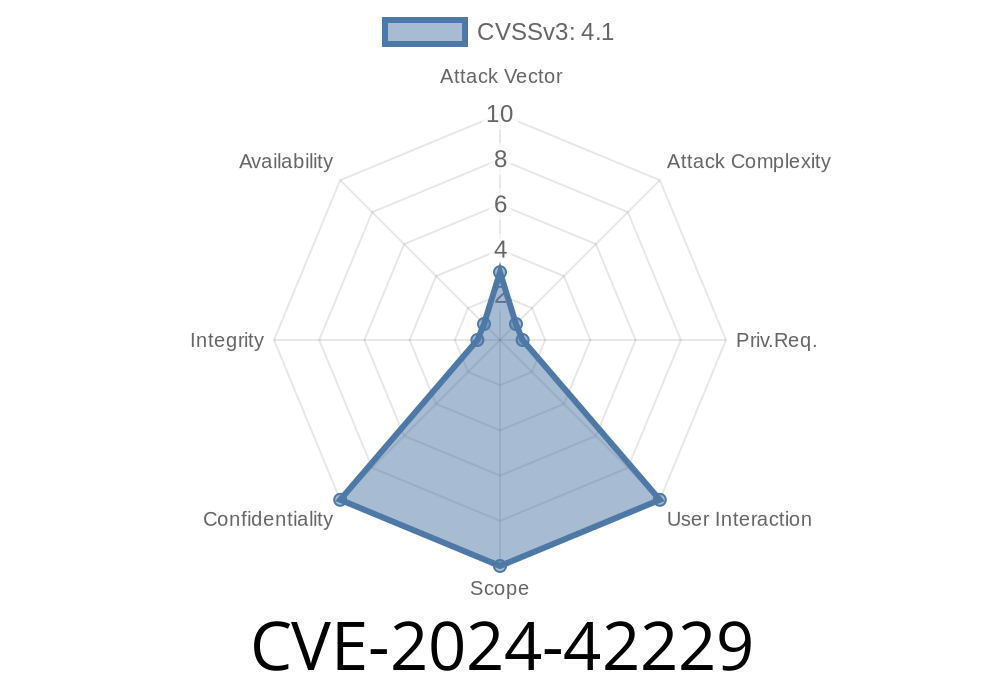CVE-2024-42229 is a vulnerability in the Linux kernel's crypto subsystem, specifically in how encryption keys are erased from memory. Prior to the fix, the kernel did not securely overwrite memory used to store cryptographic keys, meaning secrets could be exposed after use—a serious concern for secure systems. This flaw impacts the aead (Authenticated Encryption with Associated Data) and cipher modules and fails to comply with FIPS 140-3 (a federal standards requirement for cryptography).
Read on for a simple, hands-on explanation, code, exploit concepts, and links to keep you secure.
What Really Happened? (Background)
In cryptographic software, sensitive values like encryption keys should be erased from memory when they’re no longer needed. Otherwise, an attacker who gains access to system RAM—even via a crash, direct memory attack, or a malicious kernel module—might recover those keys.
In the Linux kernel’s crypto modules, buffers containing cryptographic key material were freed with kfree (just standard deallocation) instead of the more secure kfree_sensitive. The regular kfree does NOT guarantee memory is wiped before being made available for reuse, while kfree_sensitive does. That means private keys could linger in memory and be retrieved later.
FIPS 140-3 IG 9.7.B requires secure deletion ("zeroization") of these values. The Linux kernel wasn't following this rule.
Original Fix
The official kernel patch replaces calls to kfree with kfree_sensitive for any buffer that ever held key material. This is a simple, yet crucial change for security compliance.
Patch Snippet
- kfree(ctx->key);
+ kfree_sensitive(ctx->key);
Full context: LKML Patch
1. Real-World Attack Concept
Suppose a kernel module or binary running with high privilege allocates a buffer for a crypto key and later deallocates it with kfree. The memory is NOT overwritten. An attacker who gains local kernel-level access (or physically dumps RAM, or uses a kernel infoleak exploit) can scan previously used memory regions for residual keys.
2. Simple Proof-Of-Concept (PoC)*
*This is a *concept*—actual exploitation requires kernel level access (root, or an additional vulnerability).
// allocate buffer for key
char *key_buf = kmalloc(KEY_LEN, GFP_KERNEL);
// ... key_buf now holds sensitive key
memcpy(key_buf, user_key, KEY_LEN);
// use the key ...
// free buffer (before fix: does NOT wipe contents)
kfree(key_buf);
An attacker then scans freed memory for readable patterns (e.g., known key headers, wordlists, or simple entropy checks). If the kernel had used kfree_sensitive(key_buf), memory would be zeroed before being given back to the system.
3. Script Example: Locating Leaked Keys in Kernel Memory
In *userland*, it’s tough without another bug (e.g., infoleak), but with arbitrary read access to kernel memory (maybe via /dev/mem or a kernel bug):
# WARNING: Root and a vulnerable kernel required. NEVER do this on a production box.
import mmap
# Example: read from /dev/mem at an offset where kernel heap is mapped
with open("/dev/mem", "rb") as f:
mm = mmap.mmap(f.fileno(), length=4096, offset=KERNEL_HEAP_OFFSET)
dumped = mm.read()
# Scan for known key patterns or run entropy checks here
Who’s Affected?
- Linux kernels prior to the fix in this commit
Security Impact
- Non-persistent: Attackers can only recover keys if they can read kernel memory after deallocation but before memory is reused.
Mitigation & Solution
Upgrade your kernel to a version containing the fix (mainline as of April 2024). The critical change:
// After the fix:
kfree_sensitive(key_buf);
Limit physical and privileged logical access to RAM.
- Disable /dev/mem access from userspace.
References
* Linux kernel patch discussion – LKML
* Official kernel commit
* NIST: FIPS 140-3 IG 9.7.B
* kfree_sensitive documentation
Timeline
Published on: 07/30/2024 08:15:08 UTC
Last modified on: 07/30/2024 19:46:56 UTC
